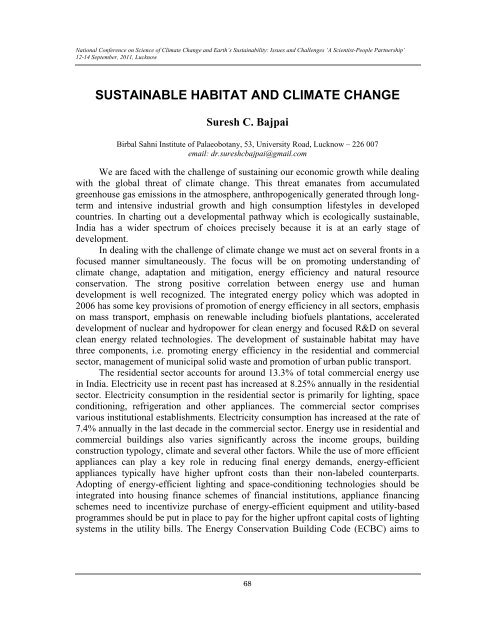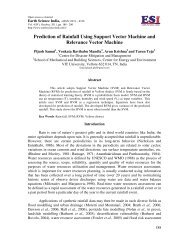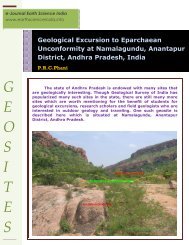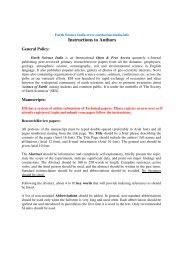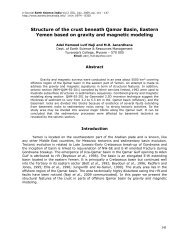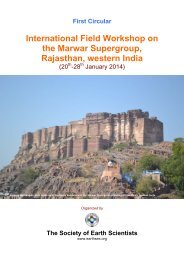12-14 September, 2011, Lucknow - Earth Science India
12-14 September, 2011, Lucknow - Earth Science India
12-14 September, 2011, Lucknow - Earth Science India
Create successful ePaper yourself
Turn your PDF publications into a flip-book with our unique Google optimized e-Paper software.
National Conference on <strong>Science</strong> of Climate Change and <strong>Earth</strong>’s Sustainability: Issues and Challenges ‘A Scientist-People Partnership’<br />
<strong>12</strong>-<strong>14</strong> <strong>September</strong>, <strong>2011</strong>, <strong>Lucknow</strong><br />
SUSTAINABLE HABITAT AND CLIMATE CHANGE<br />
Suresh C. Bajpai<br />
Birbal Sahni Institute of Palaeobotany, 53, University Road, <strong>Lucknow</strong> – 226 007<br />
email: dr.sureshcbajpai@gmail.com<br />
We are faced with the challenge of sustaining our economic growth while dealing<br />
with the global threat of climate change. This threat emanates from accumulated<br />
greenhouse gas emissions in the atmosphere, anthropogenically generated through longterm<br />
and intensive industrial growth and high consumption lifestyles in developed<br />
countries. In charting out a developmental pathway which is ecologically sustainable,<br />
<strong>India</strong> has a wider spectrum of choices precisely because it is at an early stage of<br />
development.<br />
In dealing with the challenge of climate change we must act on several fronts in a<br />
focused manner simultaneously. The focus will be on promoting understanding of<br />
climate change, adaptation and mitigation, energy efficiency and natural resource<br />
conservation. The strong positive correlation between energy use and human<br />
development is well recognized. The integrated energy policy which was adopted in<br />
2006 has some key provisions of promotion of energy efficiency in all sectors, emphasis<br />
on mass transport, emphasis on renewable including biofuels plantations, accelerated<br />
development of nuclear and hydropower for clean energy and focused R&D on several<br />
clean energy related technologies. The development of sustainable habitat may have<br />
three components, i.e. promoting energy efficiency in the residential and commercial<br />
sector, management of municipal solid waste and promotion of urban public transport.<br />
The residential sector accounts for around 13.3% of total commercial energy use<br />
in <strong>India</strong>. Electricity use in recent past has increased at 8.25% annually in the residential<br />
sector. Electricity consumption in the residential sector is primarily for lighting, space<br />
conditioning, refrigeration and other appliances. The commercial sector comprises<br />
various institutional establishments. Electricity consumption has increased at the rate of<br />
7.4% annually in the last decade in the commercial sector. Energy use in residential and<br />
commercial buildings also varies significantly across the income groups, building<br />
construction typology, climate and several other factors. While the use of more efficient<br />
appliances can play a key role in reducing final energy demands, energy-efficient<br />
appliances typically have higher upfront costs than their non-labeled counterparts.<br />
Adopting of energy-efficient lighting and space-conditioning technologies should be<br />
integrated into housing finance schemes of financial institutions, appliance financing<br />
schemes need to incentivize purchase of energy-efficient equipment and utility-based<br />
programmes should be put in place to pay for the higher upfront capital costs of lighting<br />
systems in the utility bills. The Energy Conservation Building Code (ECBC) aims to<br />
68


